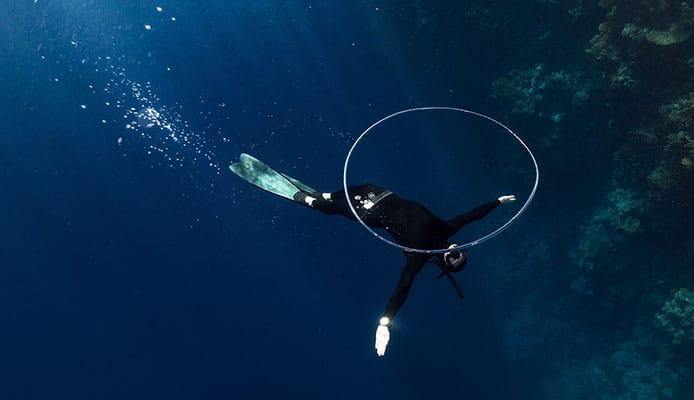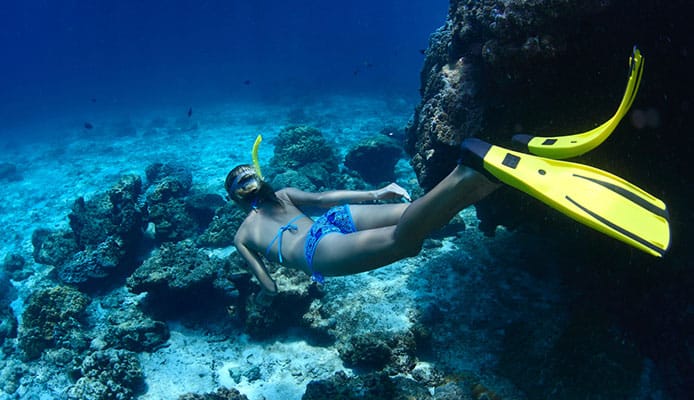
Freediving may appear to be a very simple sport for many people. The diver takes one big gulp of air, dives as deep as he or she can, and then ascends back to the surface of the water. However, everybody knows that the underwater world is one of the most unnatural environments for humans and that such surroundings carry certain risks. If you intend to give freediving a try, you have to be aware of the different freediving dangers and hazards that you will be exposed to so that you can avoid them. Outlined below are some of these risks, as well as answers to questions like can you get the bends from freediving and others.
Hypoxia
Hypoxia occurs when the oxygen supply in a diver’s body drops to critically low levels, which happens when divers hold their breath for an extended period and starve their bodies of oxygen. In cases of mild or minor hypoxia, divers can experience confusion, numbness, and minor loss of motor function and control. More severe cases of hypoxia can lead to a decline in tissue function in the body and eventually loss of consciousness. Although cases of minor hypoxia are fairly common, the more severe cases are actually rare.
To avoid hypoxia, divers are advised to take note of their limits and be sensible about pushing themselves too hard. True, freediving is all about challenging yourself to dive deeper and hold your breath longer, but you should always be careful about surpassing your previous dives and kicking hard with your freediving fins to descend to deeper depths.
Hypothermia
Hypothermia happens when a diver’s body loses more heat than it can produce, causing his or her body temperature to drop to below thirty-five degrees Celsius. This can lead to a loss of motor function and cause internal organs like the heart and the lungs to shut down.
Divers in tropical waters rarely experience hypothermia, but this doesn’t mean that they can’t suffer from it especially when there is a cold wind blowing after they get back on the boat. Those who are engaged in cold water diving though are certainly at risk of developing hypothermia in and out of the water.
To avoid this particular hazard, divers are advised to wear freediving wetsuits to help keep their bodies warm. Wearing neoprene water socks and dive gloves can also help to keep hypothermia at bay. And if the water seems too cold to dive in, it may be better to postpone your diving adventure for a now and wait for warmer and more conducive diving conditions.
Nitrogen Narcosis
Nitrogen narcosis happens when the nitrogen concentration in the divers’ blood rises above their bodies’ normal nitrogen threshold. The effects of nitrogen narcosis vary from one person to another, with some divers reporting experiencing general confusion and even hallucinations. In any case, this can be pretty dangerous as it causes divers to lose their sense of direction and even cause them to ascend too quickly (which can lead to a host of other problems).
Avoiding nitrogen narcosis is fairly simple. That is, avoid diving too deep too quickly. Use a freediving watch to monitor your dives. There are freediving watches that can alert you if you’re descending too quickly and other features like air/nitrox monitor, apnea timer, and more.
In the event you experience early symptoms of nitrogen narcosis, ascend slowly and carefully. This will help to decrease the amount of nitrogen dissolved in your blood and minimize its effects.
Barotraumas
The list of barotraumas or pressure-related injuries that one can experience while freediving is rather long and comprehensive. From ear squeeze to mask squeeze and others, the underlying causes of barotraumas are all the same. That is the increased pressure from the surrounding waters and diving volume and decreased air volume in certain organs.
Fortunately, there are plenty of ways to avoid getting barotrauma when freediving. This includes equalizing properly before every dive, avoiding making dives while recovering from an injury, using properly fitting freediving masks, avoiding making sudden movements at great depths, and more. Doing dry land exercises like stretching, reverse lung packing, and others can also help.
Preventing and treating barotraumas will depend on the type of injury you sustained while diving. Some barotraumas like a mild lung squeeze do not usually need medical attention and the effects will wear away after some time. More serious injuries like ruptured eardrums will certainly require a doctor’s expertise.
Surface Blackout
As the name suggests, surface blackouts happen above the water after the diver resurfaces. When inhaling oxygen after ascending, it takes a while before the oxygen reaches the brain and when the delay is too long it can result in the diver passing out.
To avoid surface blackouts, divers are advised to shorten their dives. Seasoned divers also use a technique called hook breathing when resurfacing which helps to push newly inhaled air towards the brain faster than normal.
Besides, being the most common of freediving injuries it is advised that divers keep an eye out for other divers who exhibit signs and symptoms of blacking out. These symptoms include slacking legs and arms, a drooping head, convulsing twitching, or when a diver suddenly stops swimming or moving for no apparent reason. Also, keep an eye out for divers even after they signal that they’re okay since they can still pass out several minutes after resurfacing.
You might also like: Freediving Weight Belt And Freediving Weight
Ascent Blackout
As opposed to surface blackouts which happen when the diver resurfaces, ascent blackout happens during the ascent. During the last five to ten meters of the ascent, the water pressure surrounding the diver’s body eases off and this rapid depressurization drops the partial pressure of oxygen in the diver’s lungs and eventually to blackouts.
Preventing ascent blackouts is pretty much the same as how you would prevent surface blackouts. That is, avoiding diving too deep too quickly and approaching your ascent carefully. Training your body to cope and work efficiently while low on oxygen can also help.
Decompression Sickness
Can you get the bends from freediving? It is possible, yes, but the reported cases are incredibly rare especially since freedivers do not breathe in compressed air while diving. However, ascending too quickly or doing too many dives in one day can cause the nitrogen in the diver’s blood to bubble and thus lead to decompression sickness. Like decompression sickness experienced by scuba divers, freedivers can experience fatigue and nausea and in extreme cases paralysis or even death.
To avoid getting decompression sickness when freediving, avoid doing too many dives in one day. Also, give yourself ample time to rest before going down again. Experts generally recommend that your surface intervals should be twice as long as your dives.
Globo Surf Overview
Freediving can be an exhilarating adventure. The thought of pushing yourself to your limits in an environment that is not normal for human beings can be really exciting and tempting. However, as beautiful as freediving may sound, it can be just as fatal. To protect yourself against the above freediving dangers and risks remember to play it safe and pace yourself while diving. Never let your ego get the best of you and strictly follow all the freediving safety rules. Having a freediving buddy with you in every dive is also a great idea.


